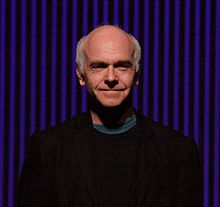John Oswald
John Anthony Oswald (born May 30, 1953 in Kitchener (Ontario) ) is a Canadian improvisation musician ( alto saxophonist , samples ) and composer . His Plunderphonics , looted sounds from other pieces of music, which were alienated and reassembled as a sound collage , have made him internationally known.
Live and act
Oswald studied at Simon Fraser University with R. Murray Schafer and Barry Truax before continuing his studies in Toronto with David Rosenboom , Casey Sokol , Richard Teitelbaum and James Tenney at York University . Oswald first worked as a saxophonist with Marvin Green in the group Pitch , which gave concerts in absolute darkness, and was from 1977 a member of the Glass Orchestra (which only played instruments made of glass ). From 1977 he recorded with Henry Kaiser the albums Ice Death (1977) and Improvised (1978); shortly thereafter a duo album with Toshinori Kondo and a solo album ( Alto Saxophone , 1981) followed. He also recorded with Alfred Harth and directed the pool improvisation ensemble , which existed until 1988. Since 1994 he has been a member of the Toronto improvisation ensemble CCMC . He also worked with Paul Haines ( Darn It ), the Kronos Quartet ( Short Stories , 1993) and Derek Bailey ( Play Backs , 1998).
In addition, he composed ballet music for various choreographers (e.g. Denise Fujiwara or James Kudelka). In 1980, Oswald founded the Mystery Tapes Laboratory , which produced and sold music and sound collages for which neither the sources of the sounds were given nor further explanations were given. In 1987 his EP Plunderphonics was released , which combined material from Count Basie , Dolly Parton , Elvis Presley and Le sacre du printemps with the help of microsampling he had developed . The CD of the same name that followed also contained recombined pieces by the Beatles , by Glen Gould ( Goldberg Variations ), Michael Jackson , Anton Webern , Franz Liszt and other authors; all sources used for the collage were specified. The album had to be withdrawn from distribution in 1990 following a lawsuit by the Canadian Recording Association for copyright infringement . In 1991 the Elektra label commissioned Oswald to pillage its catalog; In 1991 the resulting album Rubáiyát Plunderphonics was released . The album Grayfolded : Transitive Axis , which he produced, dealt in detail with the piece Dark Star by Grateful Dead , after Nine Examples of Plunderphonic Technics had already presented Oswald's approach in more detail.
Works
- aparanthesi A (2000-03)
- aparanthesi B (2000-03)
- Bell Speeds (1983, 90)
- Blur (Bolton Chili Overdire); 1 moment, 2 wow, 3 nest
- Burrows (1974-75)
- Compact (REMTV Hammercamp); 1 phase, 2 snap
- Cyfer (Depeche Mold)
- from Burrows: Silence to Say (1974)
- Grayfolded (1995)
- Homonymy (1998), flûte, hautbois, clarinette, basson, cor, trombone, percussions, violon, violoncelle, contrebasse et bande vidéo
- Mad Mod (Jello Bellafonte)
- Manifold (Bing Stingspreen); 1 philosophy, 2 phase
- Massive (Ozzie Osmond); 1 Hazzard, 2 Warning, 3 Treacherous
- Ohmigone (2001)
- Open (Bo No Ma); 1 suck, 2 rip
- Ridge (2001)
- Skindling Shadés (1987)
- Temperature (Beastie Shop Beach); 1 Tempus Amoré (Hyper Love Time), 2 Tempo Pact
- Un paysage (Ouverture) (1996)
- Urge (Marianne Faith No Morrisey); 1 slow, 2 slice, 3 blink
- Velocity (Aretha Vanilli); 1 Tremendous, 2 Tremulous
- Worse (Anthrax Squeeze Factory)
- Zoom (Sinead O'Connick Jr); 1 Alone, 2 Gogh
Lexical entries
- The Encyclopedia of Music in Canada
- Todd S. Jenkins: Free Jazz and Free Improvisation. To Encyclopedia. Vol. 2 Westport (CT), London: Greenwood Press 2004; ISBN 0-313-33314-9 .
Web links
- Short portrait (soundtrack 34)
- Brief portrait (English, Italian)
- John Oswald at Allmusic (English)
| personal data | |
|---|---|
| SURNAME | Oswald, John |
| ALTERNATIVE NAMES | Oswald, John Anthony |
| BRIEF DESCRIPTION | Canadian improvisation musician and composer |
| DATE OF BIRTH | May 30, 1953 |
| PLACE OF BIRTH | Kitchener, Ontario |
